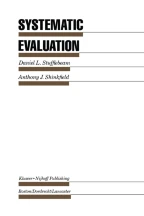Objectives-Oriented Evaluation: The Tylerian Tradition

Ralph W. Tyler developed the first systematic approach to educational eval uation. This evolved from his work in the 1930s and early 1940s on the Eight-Year Study at Ohio State University (Smith and Tyler, 1942). Since that time, Professor Tyler has continued to develop aspects of evaluation, particularly at the national level following the growth of federally funded programs in education. The extent of the esteem in which he is held can be gauged, in part, by the large number of highly reputable evaluators who have based their methodology on the Tylerian approach.
This is a preview of subscription content, log in via an institution to check access.
Access this chapter
Subscribe and save
Springer+ Basic
€32.70 /Month
- Get 10 units per month
- Download Article/Chapter or eBook
- 1 Unit = 1 Article or 1 Chapter
- Cancel anytime
Buy Now
Price includes VAT (France)
eBook EUR 42.79 Price includes VAT (France)
Softcover Book EUR 52.74 Price includes VAT (France)
Tax calculation will be finalised at checkout
Purchases are for personal use only
Preview
References
- Krathwohl, D.R. 1965. Stating objectives appropriately for program, for curriculum, and for instructional materials development. Journal of Teacher Education, 12, 83–92. Google Scholar
- Metfessel, N.S., and Michael, W.B. 1967. A paradigm involving multiple criterion measures for the evaluation of the effectiveness of school programs. Educational and Psychological Measurement, 27, 931–943. ArticleGoogle Scholar
- Michael W.B., and Metfessel, N.S. 1967. A paradigm for developing valid mea surable objectives in the evaluation of educational programs in colleges and uni versities. Educational and Psychological Measurement, 27, 373–383. ArticleGoogle Scholar
- Smith, E.R., and Tyler, R.W. 1942. Appraising and recording student progress. New York: Harper & Row. Google Scholar
- Stufflebeam, D.L., Foley, W.J., Gephart, W.J., Guba, E.G., Hammond, R.L. Merriman, H.O., and Provus, M.M. 1971. Educational evaluation and deci sion making in education. Itasca, I11.: Peacock. Google Scholar
- Tyler, L.L., and Klein, M.F. 1967. Recommendations for curriculum and instructional materials. Los Angeles: University of California, Los Angeles. (mimeo ) Google Scholar
- Tyler, R.W. 1942. General statement on evaluation. Journal of Educational Research, 35, 492–501. Google Scholar
- Tyler, R.W. 1950. Basic principles of curriculum and instruction. Chicago: University of Chicago Press. Google Scholar
- Tyler, R.W. 1953. Some persistent questions on the defining of objectives. In C.M. Lindvall (ed.), Defining educational objectives. Pittsburgh: University of Pittsburgh Press. Google Scholar
- Tyler, R.W. 1966. The objectives and plans for a national assessment of educational progress. Journal of Educational Measurement, 3, 1–10. ArticleGoogle Scholar
- Tyler, R., Gagne, R., and Scriven, M. 1967. Perspectives of curriculum evaluation. Chicago: Rand McNally. Google Scholar
- Worthen, B.R., and Sanders, J.R. 1973. Educational evaluation: Theory and practice. Worthington, Ohio: Charles A. Jones. Google Scholar
Author information
Authors and Affiliations
- Western Michigan University, Kalamazoo, Michigan, USA Daniel L. Stufflebeam
- Daniel L. Stufflebeam
You can also search for this author in PubMed Google Scholar
You can also search for this author in PubMed Google Scholar
Rights and permissions
Copyright information
© 1985 Kluwer-Nijhoff Publishing
About this chapter
Cite this chapter
Stufflebeam, D.L., Shinkfield, A.J. (1985). Objectives-Oriented Evaluation: The Tylerian Tradition. In: Systematic Evaluation. Evaluation in Education and Human Services, vol 8. Springer, Dordrecht. https://doi.org/10.1007/978-94-009-5656-8_3
Download citation
- DOI : https://doi.org/10.1007/978-94-009-5656-8_3
- Publisher Name : Springer, Dordrecht
- Print ISBN : 978-94-010-8995-1
- Online ISBN : 978-94-009-5656-8
- eBook Packages : Springer Book Archive
Share this chapter
Anyone you share the following link with will be able to read this content:
Get shareable link
Sorry, a shareable link is not currently available for this article.
Copy to clipboard
Provided by the Springer Nature SharedIt content-sharing initiative

